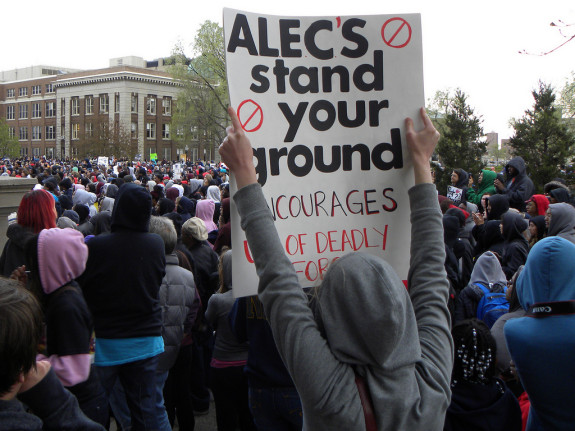
Latest murder trial puts Florida’s Stand Your Ground under fire again. (Photo via Fibonacci Blue)
By Ashley Lopez
Florida Center for Investigative Reporting
Florida’s controversial Stand Your Ground Law is under fire again.
The recent mistrial in the Michael Dunn case is to blame this time.
Dunn, a white man, shot and killed 17 year old Jordan Davis during a dispute over loud music. Davis was black. Dunn claimed self-defense.
The situation is similar to the last case that brought Florida’s sweeping self-defense law into question. George Zimmerman also shot and killed a black teenager, claiming self-defense.
Zimmerman was initially not charged with murder following Trayvon Martin’s death because of the state’s Stand Your Ground law. However, following protests nationwide, Gov. Rick Scott assigned a special prosecutor to the case.
Zimmerman was eventually acquitted of murder charges, although Stand Your Ground didn’t exactly play a pivotal role during the trial.
It’s been debated in the media whether Stand Your Ground had anything to do with Dunn’s case. The Washington Post, and others, claimed it had no role in the trial. However, both Dunn’s and Zimmerman’s judges referred to the law in their jury instructions.
Either way, much like Zimmerman, Dunn isn’t going to jail for killing a young black man and Stand Your Ground is the subject of a national conversation, again.
This time there was a mistrial in Dunn’s case and he will be facing possible jail time for the attempted murder of the other people in the car with Davis when Dunn shot at them at a gas station.
Though, according to the Associated Press, most of the jury thought Dunn should have been convicted of Davis’ murder.
A juror from the trial over a Florida teen’s death after a loud-music argument says most of the panel wanted a murder conviction and that race wasn’t a factor in deliberations.
In a Tuesday night interview with ABC News, the woman says only two jurors initially believed 47-year-old Michael Dunn was justified in the 2012 shooting outside a Jacksonville convenience store. Dunn is white; 17-year-old Jordan Davis of Marietta, Ga., was black.
She says an eventual 9-3 deadlock left jurors unable to reach a decision Saturday. They voted to convict Dunn of three counts of attempted murder over shooting at Davis’ friends, also in the SUV with the music playing.
She says the nine jurors were split among first-degree, second-degree and manslaughter verdicts.
Following the mistrial, a group of black state lawmakers began urging—again—for an investigation into Stand Your Ground to see if the law poses a threat to young black men in Florida.
“What this law has done, it’s open season for folk who are frustrated, feel fearful and have some hate in their hearts for folk of a different color,” the Rev. R.B. Holmes Jr. said during a news conference in the Capitol hallway before Gov. Rick Scott’s office. “It’s not about white or black, it’s about right and wrong. … It’s a license for folks to shoot first and ask questions later.”
Holmes and the Rev. Joseph Wright of Tallahassee joined state Reps. Alan Williams, D-Tallahassee, Gwyndolen Clark-Reed, D-Pompano Beach, and Sen. Dwight Bullard, D-Miami, for the news conference, along with attorney Benjamin Crump of Tallahassee. Crump represents the family of Trayvon Martin, the teenager shot to death in Sanford in 2012. Martin’s case drew national attention to the 2005 Florida law (SB 436) that allows people to fight back rather than retreat from what they perceive to be life-threatening situations.
The group said George Zimmerman’s acquittal in the Martin shooting, and the hung jury result on the murder count in Michael Dunn’s trial last weekend in Jacksonville, showed a disparate impact of the stand your ground law. Dunn was convicted on four other counts and State Attorney Angela Corey said she will retry the murder charge against Dunn, who was convicted of four other counts that could bring him more than 60 years in prison.
So far, research into the law has shown it does have a serious impact.
According to a graphic put together by Reuters (using data from the Florida Department of Law Enforcement), gun deaths have spiked since Stand Your Ground was enacted in 2005. And a recent study in Missouri found that murders rose after restrictions for buying handguns were removed.
Data and research from states with similar self-defense laws show that there is also a racial bias in how these laws are applied.
According to an August 2013 article from The Christian Science Monitor, “whites are significantly more successful claiming self-defense when their attacker is black than blacks are when fighting back against an attacker who is white, according to one study.”
To some, such findings are a consequence of the pandemic of violence plaguing elements of the black community. But to others, they suggest that stand-your-ground laws have allowed perceptions of the black community – sometimes accurate, sometimes not – to become a legal justification for using deadly force.
Stand-your-ground laws have begun to change the calculus of self-defense in the United States. The idea behind them is to “expand the legal justification for the use of lethal force in self-defense, thereby lowering the expected cost of using lethal force and increasing the expected cost of committing violent crime,” say researchers Cheng Cheng and Mark Hoekstra in a Texas A&M study.
Statistics included in the study bore that out, showing that justifiable homicides rose by 8 percent in stand-your-ground states, amounting to some 600 additional killings.
Despite growing research and calls from community leaders, Stand Your Ground is likely to remain the law of the land in Florida.
Leadership in the Florida Legislature has continued to stand by the law, making its repeal very unlikely in the near future.
